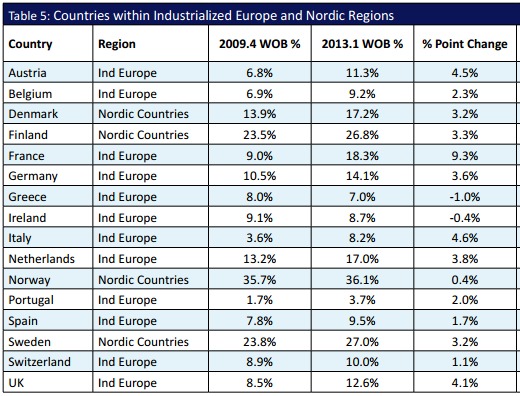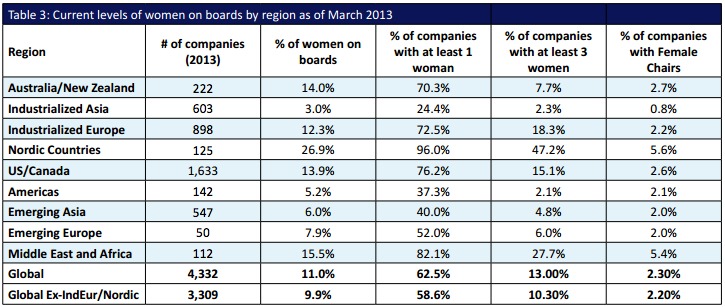
Which Countries Want You to Have a Baby?
April 20, 2014
How to Defend or Oppose Thomas Piketty
April 22, 2014Our Monday Gender Issue:
Last year, German Chancellor Angela Merkel, who had long opposed female quotas on corporate boards, capitulated. Ms. Merkel’s labor minister, a physician and mother of 6, held firm to demands that her boss accept quotas. Merkel finally agreed to a 30% minimum but not until 2020.
Because of legislation in many European nations, more women are on corporate boards:

From: GMI
Here is how Europe compares to the rest of the world:

From: GMI
While the numbers look good, reality might not be quite as rosy. In 2003, for example, Norway mandated that publicly traded companies have 40% female representation on their boards. Lack of compliance would result in delisting or “forced dissolution” from the Oslo Stock Exchange. On corporate boards, the law worked. Beyond boards, though, its impact has been limited. As one woman, called a “golden skirt” because she sits on several boards, commented, “It hasn’t had the ripple effect.” Norway has not seen more women running large corporations.
Not being able to use the “ripple effect” as the justification for female board members, we could point to studies that say more women boost the bottom line. Or, the reason to have boards that are 40% women is that women understand the women who shop. Or, diversity is good for a firm. But can we quantitatively prove any of these conclusions?
On the other hand, neither can we quantitatively prove that having men on corporate boards is better for the bottom line.
Consequently, because the male board presence tends to be self-perpetuating, don’t we need legislation to crack that glass ceiling? As a recent New Yorker article concluded, “This is about equality in our society and fairness for all women.”
Your opinion?
Sources and Resources: An article from the NY Times provided a solid factual perspective on Norway, the GMI report was perfect for statistics, and I especially liked the bias of the New Yorker piece. In addition, in its Monday gender issues focus, econlife has looked at women in the boardroom here and here.
![econlifelogotrademarkedwebsitelogo[1]](/wp-content/uploads/2024/05/econlifelogotrademarkedwebsitelogo1.png#100878)



